Table of contents
Long stays have become one of the biggest trends in hospitality during the last two years. In their Report on Travel & Living, Airbnb mentions the share of long stays (reservations longer than 28 nights) increased from 14% in 2019 to 24% in 2021. Companies like Sonder built their entire post-covid business strategy around extended stays. The Social Hub has closed a massive €300M funding round to expand its concept, blurring lines between hotel and student accommodation around Europe. And of course, we at Mews have been betting on long stays with our development.
Early in 2021, we described our vision for a hybrid model of hospitality, offering various services in various time frames, all of them supported by a single system. What have we learned about the long stay vertical since then? Let us share it with you.
The value and the resilience of long stay business
Reading about these trends and company strategies, one might be wondering: “Is it really a good idea to start offering long-term accommodation?” To this, we say yes! It’s a great idea. We’ve even got the data to back it up.
Cancellation rate data
First, we looked at the resilience of long stay business and compared cancellation rates for stays of 1-7 days with those longer than 27 days in countries recently impacted by strict covid measures. Specially, this data covers Austria, the Netherlands, and Germany in 2021 between July 1 and the end of the year. Measures such as closed non-essential shops, restaurants and bars were introduced in the second half of November 2021 in these countries.
The cancellation rate shown below is calculated as reservations cancelled/reservations created in each week. The first graph shows long stay reservations, the second shows short stays.
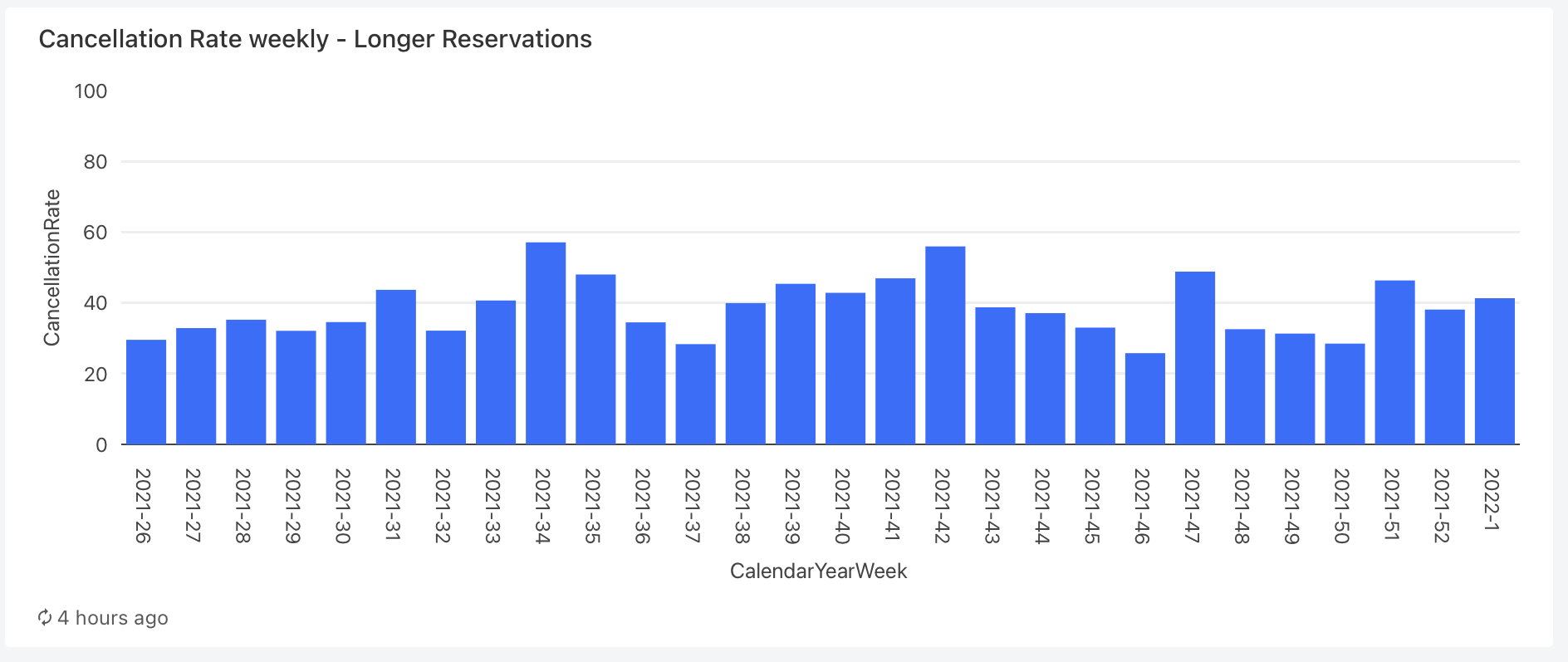
.png?width=1890&name=cancellation-rates%20(1).png)
What does the chart tell us? Guests booking stays longer than 27 days are much less likely to let Covid measures change their decision to travel. These people are very often relocating for business or studies and once they book their stay, it’s likely that they will actually arrive. For short term stays, the cancellation rate in these countries is currently three times higher. Put plainly, people will cancel their weekend trip to Amsterdam because of Covid measures, but they won’t cancel their job or university studies.
Financial data
Now that we understand the resilience of the long stay business, we should look at the financial metrics. Firstly, the average daily rate (ADR). Again, we’re looking at data from Austria, the Netherlands, and Germany and comparing stays of 1-7 days with stays longer than 27 days.
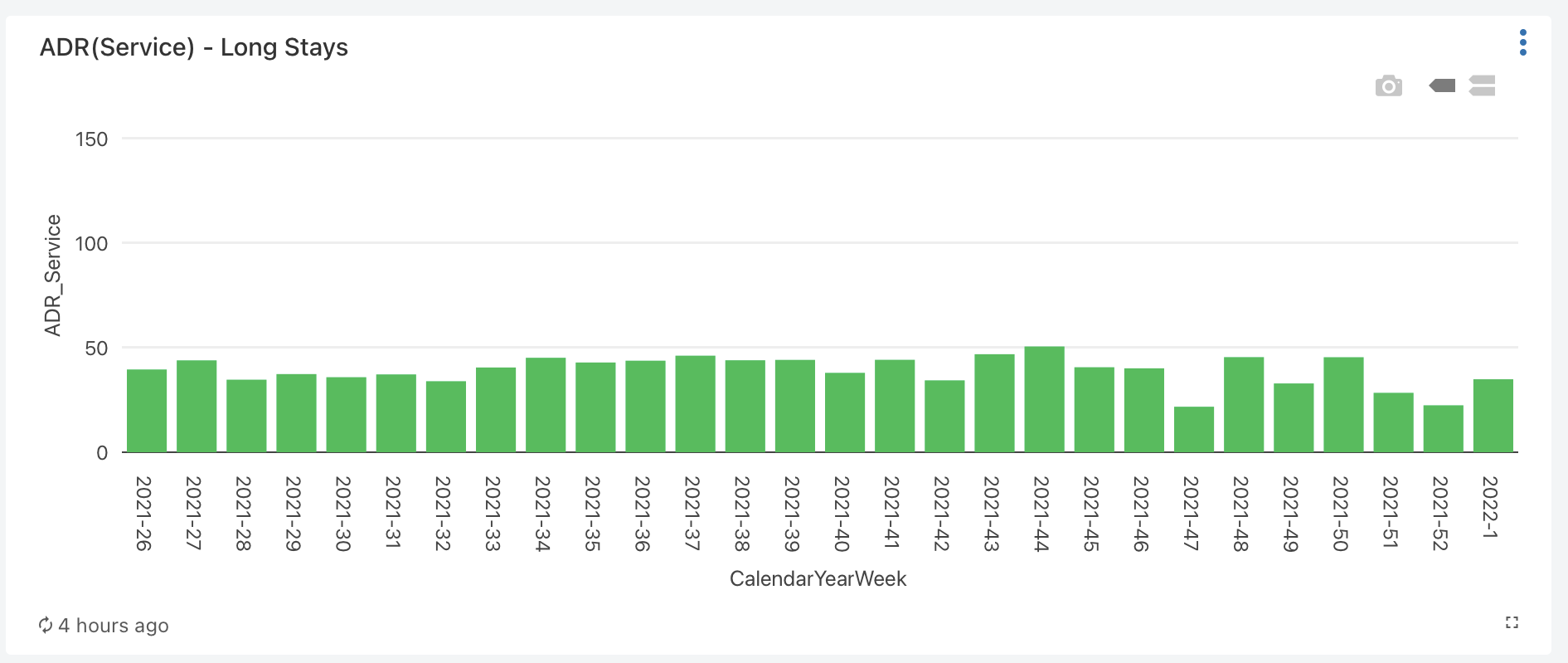
.png?width=1897&name=adr%20(1).png)
The difference is clear: the ADR for short stays (around €100) is approximately double the ADR of long stays (€40-50). Yes, that looks a lot better in the Manager Report. In the next metric, however, the long stays win. Here’s the average value of reservation (additional products and services are not considered).
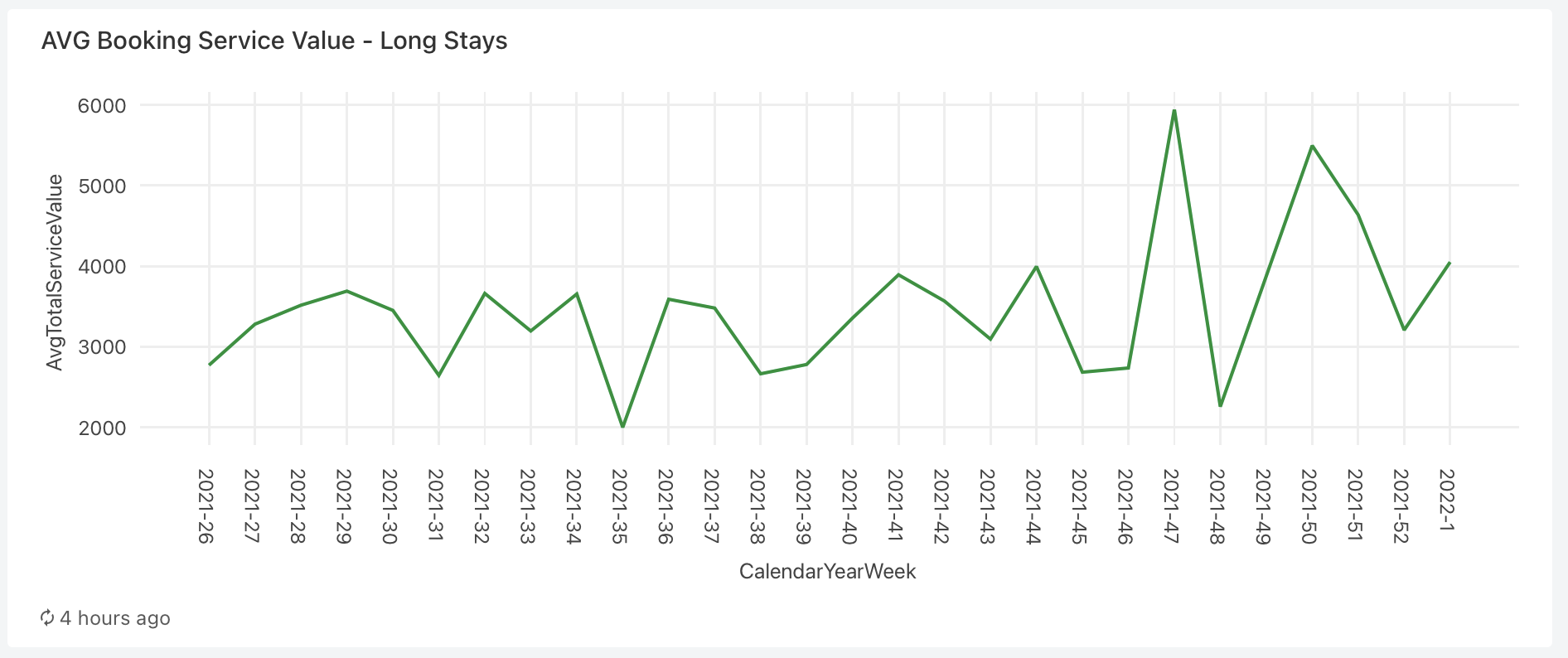
.png?width=1883&name=abv%20(1).png)
The average value of reservation for long stays is 15 to 20 times higher. If you manage to attract guests for this type of stay, they are golden eggs, bringing in an average of €4000.
Operations data and more
There are other metrics suggesting that long stay business can be very beneficial. If we consider occupancy and operations costs, long stay business is more efficient. The average length of long stays in our data is around 100 days. For these 100 days, your room is 100% occupied as there are no gaps between reservations. This can probably never be achieved with short stays. Therefore, the real metric you should focus on should be the revenue from an available space for a period of three or four months.
Housekeeping is another good example for operational costs. Short stay guests expect the room to be cleaned, if not on daily basis, then at least once in three to four days. When they check out, the entire room needs to be deep cleaned. The long stay guest, on the other hand, does not expect this frequency of housekeeping. You can extend the interval to one or two weeks, and they can always request on-demand cleaning – for an additional cost.
Finally, the long stay guests also have some special needs. They might want to book a meeting room in your hotel or hire transport from/to the airport as they have more luggage than a regular guest. We’ll cover these upsell opportunities in the next section of this article.
To sum up our findings, long stay business is much more resilient in uncertain times. The total value of the long reservation tends to be very high. The ADR is lower than for short stays, but it can be compensated by higher long-term occupancy, more efficient operations, and new opportunities for upselling and cross-selling the guests.
Who are long stay guests and what do they need?
We’ve spent a lot of time learning about the guests booking long stays. What is their motivation to book and what are their needs and expectations?
If you saw any of the recent presentations by Airbnb, Sonder, or Selina, you’ll have noticed that they focus on communities of remote workers and digital nomads. They roam the world, lightweight and independent, working remotely and enjoying life in exciting locations.
Our own research focused on two other types of guests: students and relocating professionals. These professionals also have special requirements and are sometimes are willing to pay a premium to have them addressed. We interviewed dozens of guests from these two groups and gathered many interesting insights.
Reasons for travel
Students are coming to cities like Amsterdam, Copenhagen, and Vienna from all around the world. They typically spend one to four years there, but the housing situation in these cities often doesn’t allow them to rent an entire place for themselves. And in many cases, they’re not even interested in that. They enjoy the community spirit in properties like The Social Hub, Casa or The Fizz.
Relocating professionals are slightly older (typically around 30) and are brought to a new city by their company – usually to start a new job or move to a different office – and their hotel is often paid for. They’re looking for a cozy place to stay that allows them to fully focus on their new role while they search for permanent accommodation. Looking for a perfect example of a brand focused on this market? Check out Zoku.
Upselling opportunities
These two groups may differ in terms of age, expectations, and budget, but they also have many things in common – and they bring some exciting opportunities to upsell new services and products.
It starts with the arrival. Imagine you’re moving to a city you barely know, most likely for several years. You’ll want to bring more than just a backpack and carry-on luggage. Many of the students and professionals travel with up to eight suitcases and the trip from the airport to the hotel is an unpleasant process for them. But this is a perfect opportunity for the hotel: offer your long stay guests a transport from the airport with all their possessions for a fair price and they will love you forever. Your guests will have a smooth arrival, and you’ll generate extra revenue while delivering a great first experience to your guests. It’s a win-win.
Space to study or work will be appreciated by both students and professionals. Adjust the rooms and provide a desk where they can work comfortably, and you’ll increase the time they spend in your property. Do you have a lobby that could be transformed into a collaborative space, offices, or meeting rooms? Consider offering them as an upsell or in packages with the accommodation.
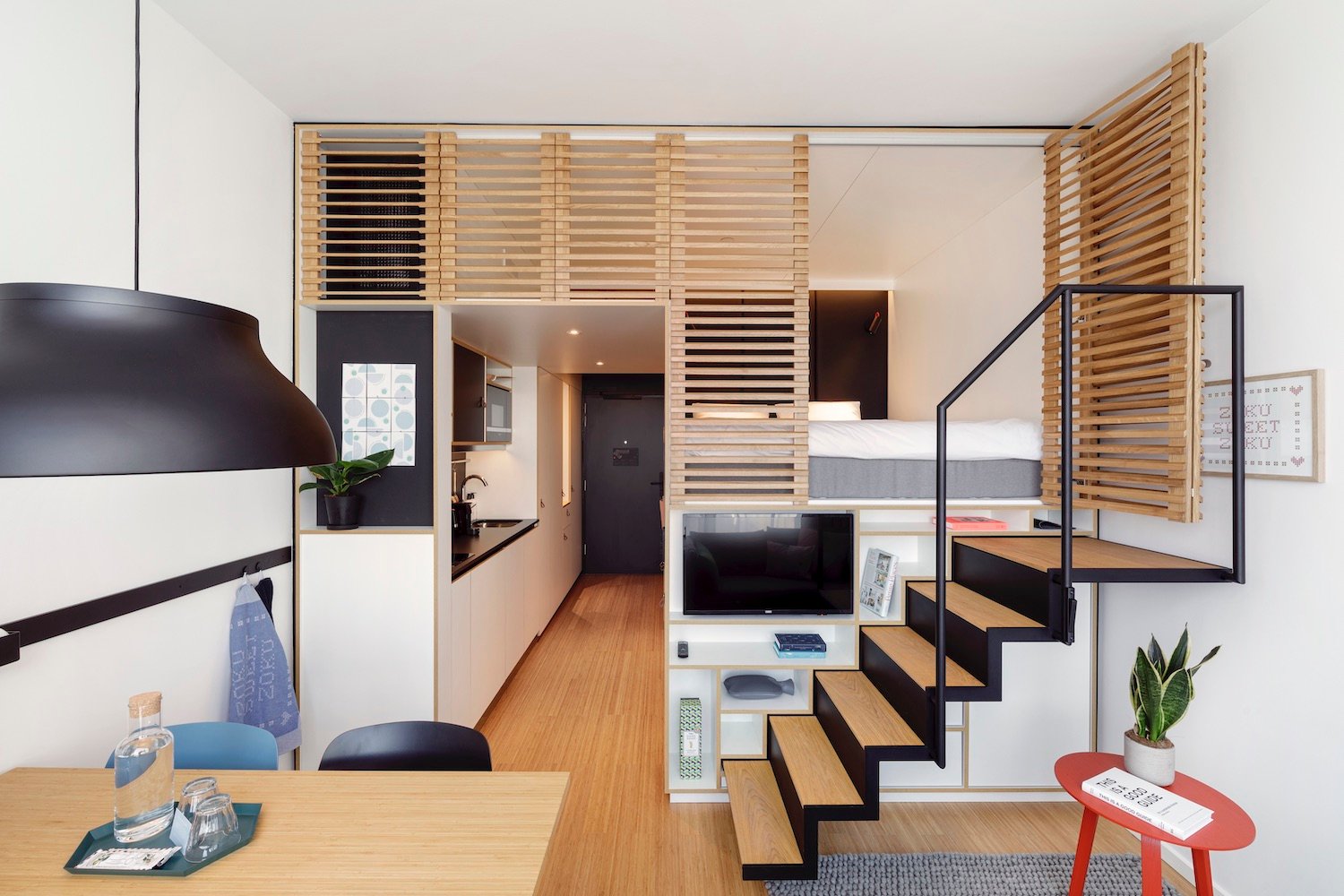 Zoku Lofts are 100% optimized for both living and working.
Zoku Lofts are 100% optimized for both living and working.
Laundry and kitchen needs are also similar for both groups. Make sure that the laundry machine is easily bookable at a fair price and guests will happily use it. Provide all the basic stuff in the kitchen (knives, plates, detergents etc.) and consider upsells such as coffee machines or smoothie makers. Additional housekeeping can be also offered as an on-demand service.
Guests staying for a longer period will also appreciate options for free-time activities. Don’t forget, they’re in a new city with a very limited social network. Offer them yoga classes or running groups, organize tech talks or music evenings. They will use the opportunity to spend their time in a meaningful way and build new friendships.
Finally, think about the long-term value you can offer to these guests. They’ll spend a long time and a significant amount of money in your hotel. They’ll have built new friendships and professional contacts there. How will you bring them back in the future? You can achieve this through a loyalty program or through services such as co-working space or office/meeting room. Those meetups and music evenings are also a good option.
Based on our findings, long stay guests tend to build a very strong connection with the place where they spent the first weeks and months in the new city. Think about it while they are checking out, make them feel special. Give them reasons to come back in the future and they will!
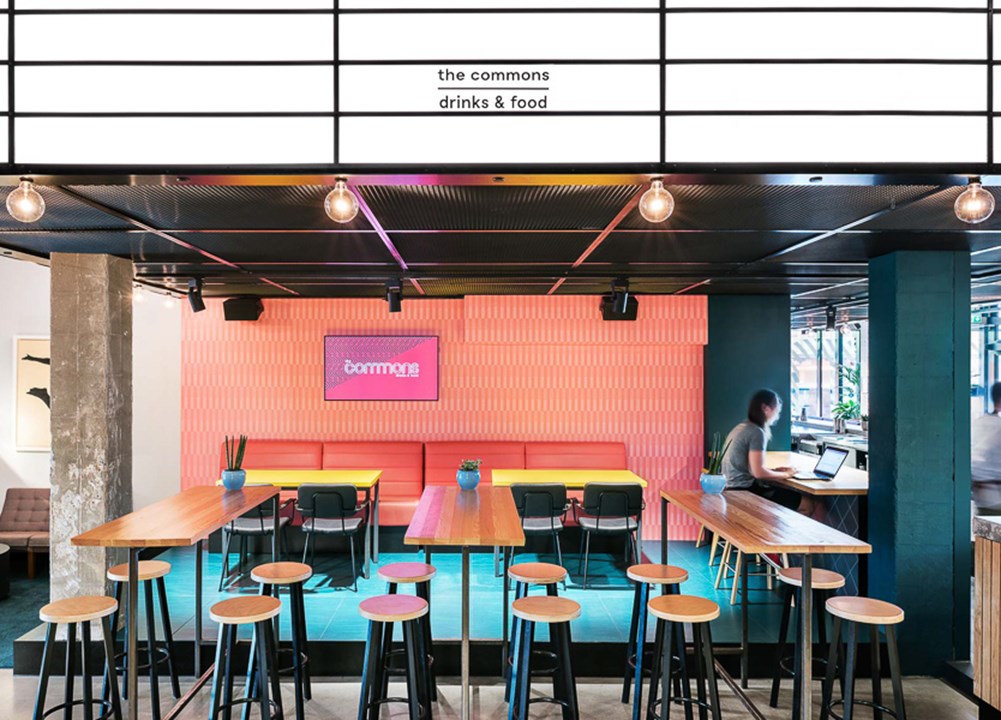 Give your guests a space to socialize and they will come back in the future (The Social Hub, The Hague) .
Give your guests a space to socialize and they will come back in the future (The Social Hub, The Hague) .
How Mews helps with your long stay services
Now that we explained the business potential of long stays and some of the specifics of long stay guests, it’s time to look at Mews’ roadmap. How are we going to make the management of long stays in our system effortless and smooth?
There are multiple ongoing initiatives around this topic. We already have many customers using the Mews platform to manage long stays, and so we reached out to these users to see how we could improve. The timeline, rates management, and billing were the most common pain points, and we’ve already pushed the first improvements live.
In early December, monthly grouping on bills was released. The functionality allows the user to select and process all items (nights, products, taxes etc.) in each month. Moving all December nights is now a matter of two or three clicks. Previously, each item had to be selected separately; 31 nights meant 31 clicks. With this functionality, the billing process is speeded up significantly.
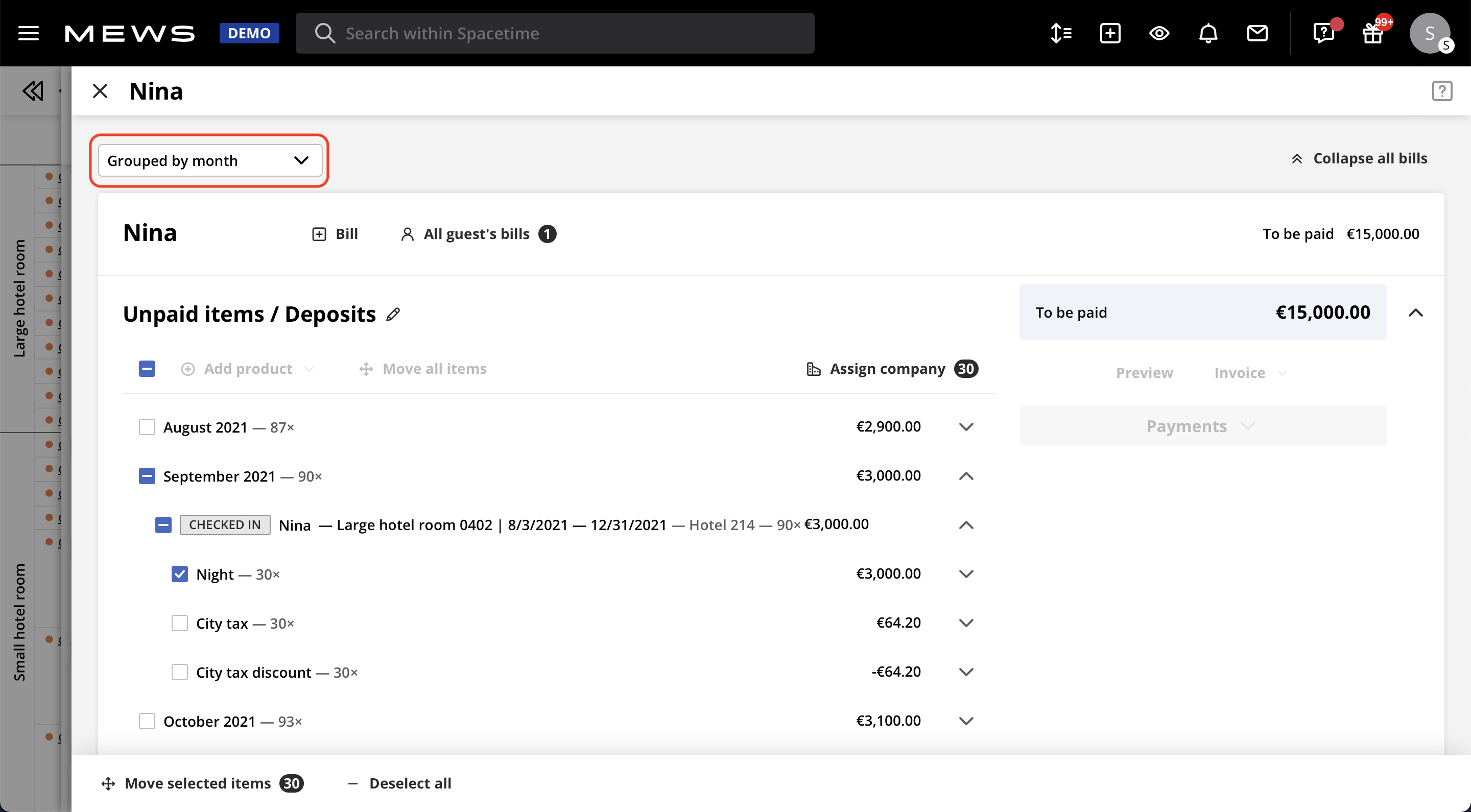 Monthly grouping on the bill
Monthly grouping on the bill
Another improvement and optimization for long stay management is coming to the timeline: we’re adding a new, monthly view. This will be particularly useful for properties with large number of reservations longer than one month. Previously, the maximum view on the timeline was seven to ten days; with this improvement, the user will be able to see 12-15 months in a single view.
Our ultimate goal for 2022 will be the introduction of monthly time units. Hotels will be able to price and report on monthly basis. Guests will book months instead of nights or days. The entire system will be optimized for monthly services. In our October survey, we asked customers to what extent do they agree or disagree with the following statement:
"Mews makes it easy for me to handle reservations longer than 30 days."
Only 7 percent of our customers agreed that we make the management of long stays effortless. 93 percent didn’t. There's huge room for improvement in this area and we’re fully committed to get there. We already have the necessary understanding of the market and the guests’ needs and preferences. Now it’s time to build the solutions.
If you already see the potential of long stays, make sure to read our guide on how to set up a new bookable service in Mews and then go ahead and do it. You can welcome your new guests immediately!
The guide to Maximizing Your Property's Full Potential
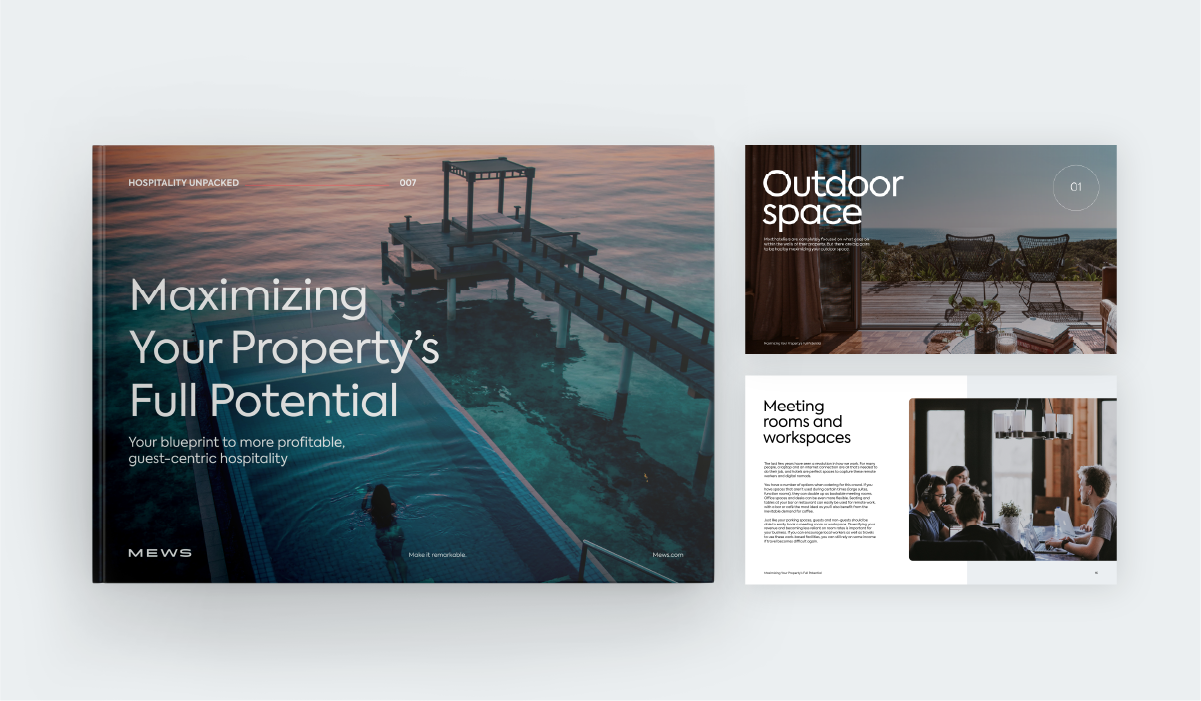
Long stay accommodation is one of the many topics we cover in our beautifully crafted guide, Maximizing Your Property's Full Potential. It's packed with tips and advice, success stories and potential tech partners that will help you make the most of your space.

2026 Hospitality Industry Outlook
Download now
Table of contents
Hospitality hot takes straight to your inbox




.webp)
